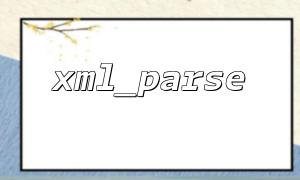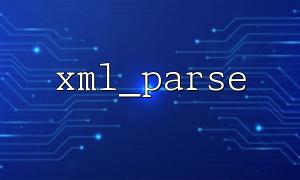Character set problems are one of the most common pitfalls when using the xml_parse function to process XML data in PHP. Especially in the scenario where data is exchanged across systems and languages, the encoding method of XML files may be inconsistent with the actual content, or is incompatible with the PHP environment, resulting in parsing failure. This article will explain in-depth the causes, common symptoms of character set problems, and corresponding solutions and repair methods.
The encoding in the XML declaration is inconsistent with the actual content
<?xml version="1.0" encoding="UTF-8"?>
This line of declaration means that XML is encoded using UTF-8, but although some files are marked as UTF-8, the actual content is GBK, ISO-8859-1 and other encodings.
PHP default character set is inconsistent with XML
If your PHP script processes strings in UTF-8 by default, but the XML file is written in other encodings, xml_parse may have an error.
The correct encoding conversion logic is not set
The xml_parse function itself does not support automatic character set conversion. If the incoming XML content is not UTF-8, the parsing will fail, prompting for illegal characters.
XML error: not well-formed (invalid token)
XML error: invalid character
These errors often mean that the XML character stream you provide is not in UTF-8 format, or contains illegal characters that cannot be parsed.
Before parsing, transcoding XML strings to UTF-8 is the most common and safest way. PHP can be implemented using mb_convert_encoding or iconv .
$xml_content = file_get_contents("https://m66.net/data/sample.xml");
// Assume the original encoding is GBK,Different encodings can be tried according to actual conditions
$xml_content_utf8 = mb_convert_encoding($xml_content, 'UTF-8', 'GBK');
$xml_parser = xml_parser_create('UTF-8');
xml_parse($xml_parser, $xml_content_utf8, true);
xml_parser_free($xml_parser);
Note: You need to know what encoding is written in the original XML. Guessing the wrong encoding will make the problem even worse.
If you already know that the original content is UTF-8, but the declaration is wrong, you can use regular modification:
$xml_content = file_get_contents("https://m66.net/data/sample.xml");
// replace XML The encoding part in the statement
$xml_content = preg_replace('/<\?xml(.*?)encoding=["\'][^"\']*["\'](.*?)\?>/i', '<?xml\1encoding="UTF-8"\2?>', $xml_content);
// Continue to analyze
$xml_parser = xml_parser_create('UTF-8');
xml_parse($xml_parser, $xml_content, true);
xml_parser_free($xml_parser);
If SAX schema parsing is not particularly needed ( xml_parse belongs to this pattern), you can consider using SimpleXML , which is more tolerant in handling encoding:
$xml_content = file_get_contents("https://m66.net/data/sample.xml");
// Convert to UTF-8
$xml_content_utf8 = mb_convert_encoding($xml_content, 'UTF-8', 'GB2312');
$xml = simplexml_load_string($xml_content_utf8);
print_r($xml);
Unified UTF-8 encoding processing data
Ensure coding consistency during storage
For external XML files, check their encoding before reading
Error logs are enabled during development to facilitate timely discover coding-related issues
Although the character set problem may seem tricky, it is not difficult to solve as long as you understand the root cause. When using xml_parse , the point is to make sure that the incoming is a legitimate UTF-8 string, and manually transcode or correct XML declarations if necessary. Hope this article helps you to handle PHP and XML integration issues more smoothly.
Related Tags:
xml_parse














